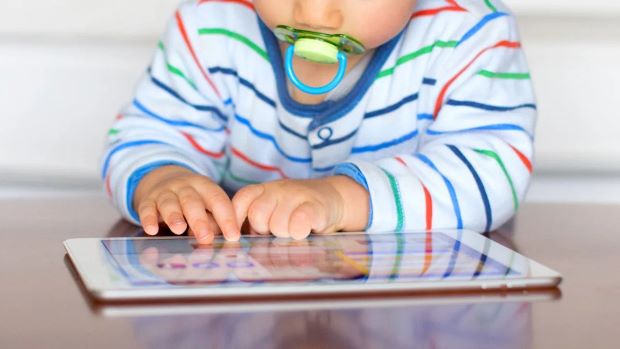More screen time linked to delayed development in babies, study finds
By Matt Richte
One-year-olds exposed to more than four hours of screen time a day experienced developmental delays in communication and problem-solving skills at ages 2 and 4, according to a study published in The Journal of the American Medical Association Paediatrics on Wednesday (23).
The research also found that 1-year-olds who were exposed to more screen time than their peers showed delays at age 2 in the development of fine motor and personal and social skills. But these delays appeared to dissipate by age 4.
The study did not find that the screen time caused the developmental delays but, rather, found an association between babies who were exposed to more screen time and delays in their development. That pattern could well be explained by the value of face-to-face time for young children, experts said.
Why It Matters
David J. Lewkowicz, a developmental psychologist at the Yale Child Study Centre, said that face-to-face interaction between parent and child is crucial in giving babies a rich set of information, including about how facial expressions, words, tone of voice and physical feedback all combine to convey language and meaning.
“It doesn’t happen when you’re watching the screen,” he said, adding that he was not surprised by the research results.
The findings, conducted by scholars in Japan, were drawn from questionnaires about development and screen time, which were given to parents of nearly 8,000 young children. In general, babies exposed to higher levels of screen time were found to be the children of first-time mothers who were younger, and with lower incomes and household education levels, and those suffering postpartum depression. (Only 4% of babies were reported to be exposed to screens for four or more hours a day, while 18% had two to less than four hours of screen time a day and a majority had less than two hours.)
The study noted a “dose-response association” between screen time and developmental delays: The more screen time babies were given, the more likely they were to show developmental delays.
What’s Next
The study’s authors noted that the research did not distinguish between screen time that was intended to be educational and screen time more focused on entertainment. Future studies, the researchers added, should explore that angle.
Lewkowicz said that parents regularly asked him how much screen time was the right amount. His answer: “Talk to your child as much as you can, face-to-face as much as you can,” he said.
To ask parents to withhold all screen time from their babies was impractical, he said: “No parent would listen to that. It just has to be in moderation. With a heavy dose of real-life social interaction.”
-New York Times



Comments are closed, but trackbacks and pingbacks are open.